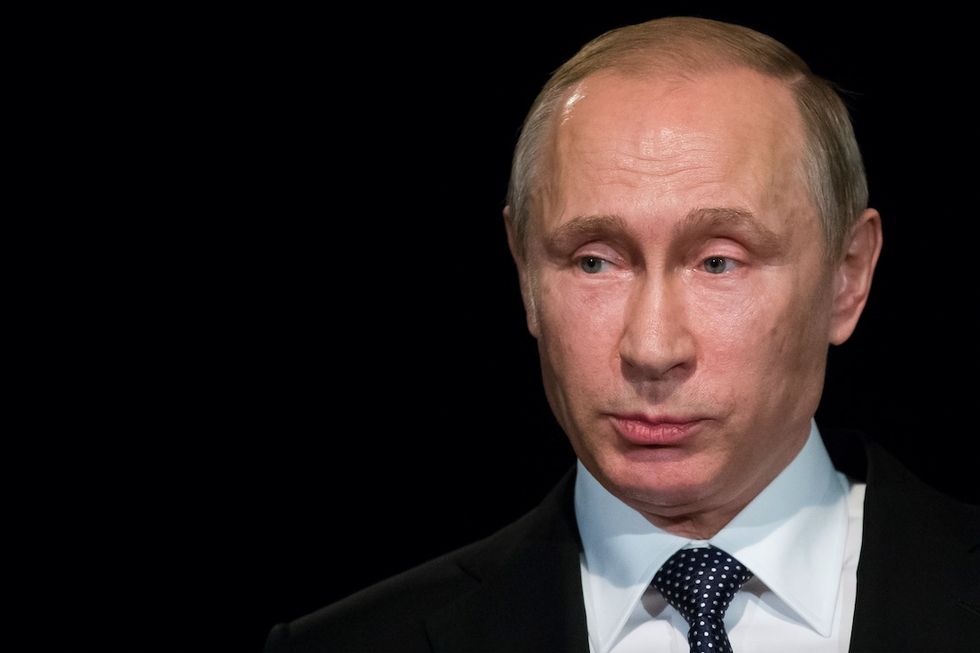
Russian President Vladimir Putin gestures as he addresses students during his visit to German Embassy school in Moscow, Russia. (AP Photo/Alexander Zemlianichenko, file)

BEIRUT (TheBlaze/AP) -- The Islamic State group's spokesman and chief strategist, who laid out the blueprint for the extremist group's attacks against the West, has been killed while overseeing operations in northern Syria, the group has announced.
The IS-run Aamaq news agency said Abu Mohammed al-Adnani was "martyred while surveying the operations to repel the military campaigns in Aleppo." It did not provide any further details on when or how he died. A later statement issued by the Islamic State group in Aleppo province vowed to avenge his death. Both statements were released late Tuesday evening.
Russia's Defense Ministry said on Wednesday that its airstrike killed al-Adnani. In a statement, the Defense Ministry said its intelligence had confirmed that a Russian airstrike in Aleppo province had killed 40 IS militants, including the group's spokesman.
#BREAKING #ISIS Spokesman Abu Muhammed Al-Adnani has been killed in #Aleppo , #Syria . pic.twitter.com/I0C8T8jbFA
— Rasan Remzi (@RasanRemzi) August 30, 2016
However, Pentagon Press Secretary Peter Cook said on Tuesday that a U.S. airstrike targeted al-Adnani in the Syrian city of al-Bab, which is northeast of the city of Aleppo, the provincial capital. He said the U.S. was "still assessing the results of the strike."
A U.S. defense official on Wednesday responded to the Kremlin's claim, calling it "laughable."
"It would be laughable but for the very real humanitarian suffering Russia has inflicted," the official reportedly told CNN, adding that the Pentagon stands behind what it said Tuesday about the U.S. conducting the strike that killed al-Adnani.
US defense official calls Russia's claim that it killed ISIS spokesman "laughable" https://t.co/XzFWOUHXlr https://t.co/LIUREB6GGg
— CNN (@CNN) August 31, 2016
The Sunni militant group did not say whom it blamed for the airstrike.
Al-Adnani's death is a major blow to the extremist group, which has been on the retreat in Syria and Iraq.
Al-Adnani, whose real name is Taha Sobhi Falaha, persistently called for attacks against the West, which paid off in bloody notoriety with the Nov. 13 coordinated attacks in Paris that hit a concert hall, a stadium and restaurants and bars, leaving 130 people dead and hundreds wounded.
He was a Syrian who was born in the northern province of Idlib and is believed to have been in his late 30s. He crossed the border and joined al-Qaida in Iraq, a precursor to IS, after the 2003 U.S.-led invasion.
In late June 2014, he formally declared the establishment of a caliphate, or Islamic state, stretching across parts of Syria and Iraq, under the leadership of Abu Bakr al-Baghdadi, and demanded allegiance from Muslims worldwide.
A powerful orator, he went on to become the voice of IS. He released numerous audio files online in which he delivered fiery sermons urging followers to kill civilians in nations that supported the U.S.-led coalition against the group.
Earlier this year, he called for massive attacks during Ramadan - a call that translated into the bloodiest Muslim holy month in recent memory. Followers of IS carried out attacks on several continents, including the Orlando shooting, the Nice truck attack in France and a massive suicide bombing in downtown Baghdad.
Aleppo is a current focal point of the civil war in Syria, where IS, Syrian Kurdish forces, Turkey-backed rebels and President Bashar Assad's forces are vying for control. The province is frequently struck by both U.S.-led coalition airstrikes and Russian air raids.
The Islamic State group has suffered a string of defeats in recent weeks, including in Aleppo province, where Turkish troops and allied Syrian rebels drove IS out of the border town of Jarablus last week.
In Iraq, the group has lost its strongholds in Fallujah and Ramadi, in the western Anbar province. It still controls Mosul, but Iraqi forces are gearing up for a long-awaited operation to retake the country's second largest city.
It has also lost some of its most senior commanders and founding members over the past year, including its "minister of war" Omar al-Shishani, feared Iraqi militant Shaker Wuhayeb, also known as Abu Wahib, and a top finance official known by several names, including Abu Ali Al-Anbari.
—